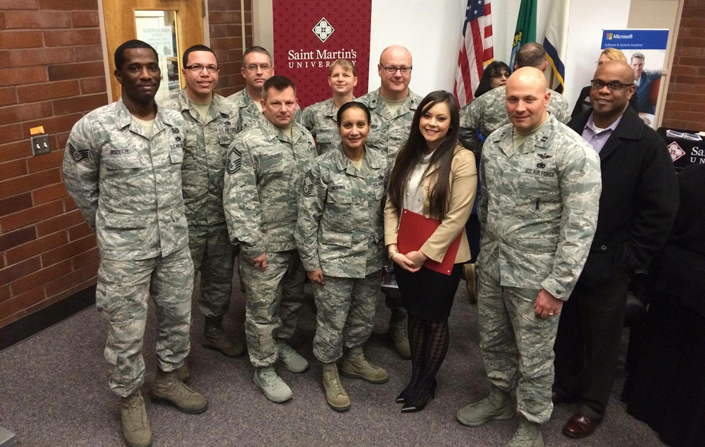MSSA grads take parallel paths that lead to Fargo
Many graduates of Microsoft Software & Systems Academy (MSSA) end up working for Microsoft in Redmond, Wash. Some find careers at other companies. And some end up working for Microsoft — but not in Redmond. Microsoft has sales offices, support centers and technology centers throughout the country, including places like Fargo, N.D. And it’s that office in Fargo where two MSSA grads recently landed.
“I’d always planned on staying in Washington; I still own a home there,” says Lisa Haywood, cloud specialist for Office 365 at Microsoft. “But the more that I was reading up about the Fargo campus, and Fargo in general — it was ranked No. 7 in the ‘Best Small Places for Business and Careers in 2015’ Forbes list — I thought it sounded kinda nice. And when I met the Microsoft Fargo team, I knew: This is where I’m going to be. I even had an offer from Amazon Web Services, which would have kept me in Washington state, but I knew I needed to go with Microsoft. Fargo was the right place for me.”
MSSA is an intensive 18-week course at multiple bases across the country that provides active duty U.S. service members with the career skills necessary to meet the IT industry’s high demand for talent. Graduates are guaranteed an interview at Microsoft or one of its hiring partners.
Haywood, who was a staff sergeant in the Air Force and still serves in the Air Force Reserve, says it was an MSSA mentor who turned her and fellow MSSA grad David Driggers, cloud engagement specialist at Microsoft, on to the opportunity in Fargo. Both work in sales roles, which is not necessarily the typical trajectory for an MSSA grad.
“When I first researched MSSA, the message was, ‘You don’t have to be an expert in technology or computers; we’re going to teach you that. All you have to do is show interest,’” says Driggers, a former sergeant in the Army. “Once I got in, I found out that, though I am passionate about technology, I was not in love with working behind a computer. But during the span of the program, I learned that I could take this passion for technology and apply it to other places. I can hold and drive conversations, so why not put that effort toward a sales job? And that’s where I’m shining now.”
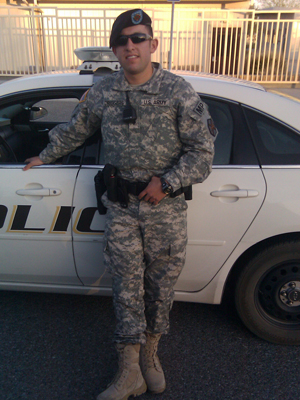
Driggers did not have a tech background going into MSSA; during the eight years he served in the Army, he was a military police officer. He was responsible for enforcing the Uniform Code of Military Justice, state law and local law on base. This role led to a lot of knowledge about law enforcement and how to work with challenging situations, but not much knowledge of hardware or software.
Haywood says she had similar reservations after joining the program, as her role for eight years in the Air Force centered on logistics. As a vehicle operator dispatcher, Haywood was in charge of moving people and cargo, either as a dispatcher sending operators out to perform moves or as an operator herself. Like Driggers, this role allowed Haywood to hone her customer service skills, but it did not provide Haywood with a tech background.
“When I started the MSSA program, I looked around and I was surrounded by 35 brilliant and intelligent people who had spent 20 years in IT, building network infrastructures for the government,” Haywood says. “And I had no technology experience. I came from logistics, I worked in the restaurant industry before joining the military: I literally had no experience. So I assumed I wouldn’t get hired. But I ended up being the second person from my cohort to get offered a job with Microsoft. I couldn’t believe it.”
Once they began MSSA, Driggers and Haywood realized that not only did they have similar fears about their technological prowess, they also had similar goals: to support their families. Both had two children, and both worried about being able to make ends meet after leaving the stability of the military. Haywood says having Driggers in the course with her was a huge source of support — and still is.
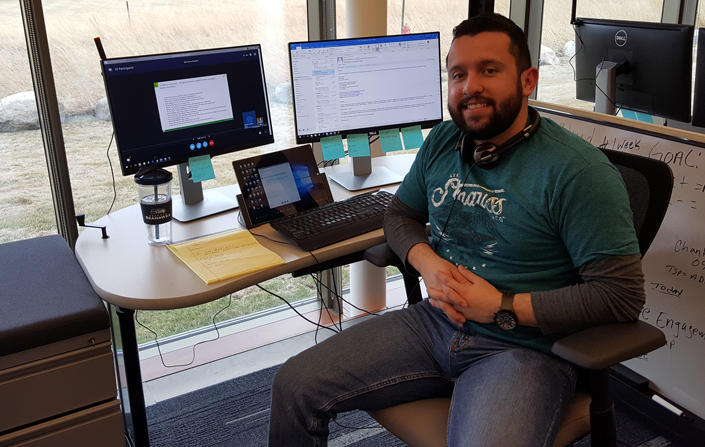
“We definitely leaned on each other a lot,” she says. “We were in such a similar boat — we both knew what we needed to do to survive and put food on the table for our families. And I still lean on him here. We talk very regularly.”
That sort of camaraderie is not unusual for former service members to form in their new jobs; it’s a natural extension of the family they’ve built during their service. And the military community at Microsoft is no exception, Haywood says.
“The military is so tight-knit, and it doesn’t matter if you still serve, are in the Reserve or have completed your service,” she says. “We all have a story that we can relate to each other. That we’ve walked in those shoes before. So, you really do have somebody to lean on, even here in Fargo.”
But a sense of family is not the only thing Driggers and Haywood have brought with them to their new careers. They both say their experiences in the military have made them uniquely suited for the roles they now hold at Microsoft.
“Being in law enforcement, 98 percent of the people I dealt with were having the worst day of their life,” Driggers says. “And I would have to keep my cool, ask questions, try to figure out the story and drive conversations; now I’m having much the same conversations. I find out what a customer needs, what his goals are, what he’s trying to accomplish and how Microsoft can better assist him.”
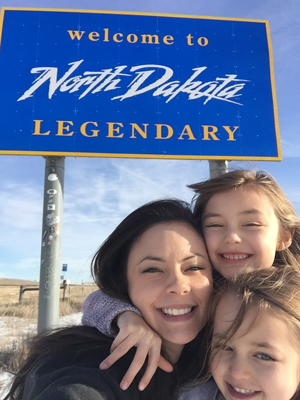
Similarly, Haywood says her logistics role in the Air Force gave her skills she uses every day at Microsoft. “In the military, I had a customer-facing role,” she says. “We provided a service, and it really gave me the people skills I needed to talk to my customers, from all walks of life. To deal with the grumpy ones, the happy ones, the confused ones. I can have a conversation and get to a level where we’re on the same page by the end of the conversation.”
However, Haywood and Driggers agree that none of their current success would be possible without MSSA. The course not only taught them about technology and how they could apply that knowledge to their future civilian careers, it also taught them the basics of acquiring those positions.
“MSSA taught me what it is to leverage other professionals from other industries,” Haywood says. “They don’t have to be in your line of work. In fact, it’s probably better — how are you going to grow if you’re networking with people who are just like you? That was probably the biggest golden ticket I got out of the MSSA program: the people it introduced you to.”
Networking is key to a successful transition out of the military, both Driggers and Haywood agree, but Driggers says that all the networking in the world won’t help you if you don’t have a solid transition plan in place long before your separation date.
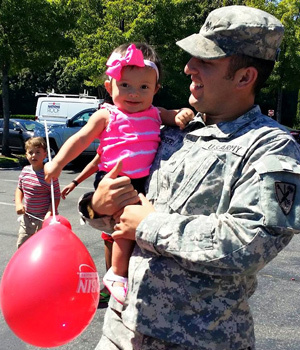
“I thought I was being forward-thinking, planning a year out from my separation date,” Driggers says. “But when I got into MSSA, some of the higher ranking individuals told me they were two years out, planning, taking courses and getting stuff ready. I couldn’t believe it. I felt like I was behind the curve.”
And both Haywood and Driggers emphasize that service members must take the time before separation to focus on themselves and their transition plans.
“MSSA was the first time that I ever focused on me,” Haywood says. “I spent my entire military career focused on the mission, on being a team member. But when you become a civilian, you have to start taking ownership: I did this. I’m the individual contributor that is helping drive the growth of this business. And that change takes work. A lot of people don’t ever shed their military skin. I’m grateful that MSSA allowed me the time and space to go through that shift before I was out of the service.”
